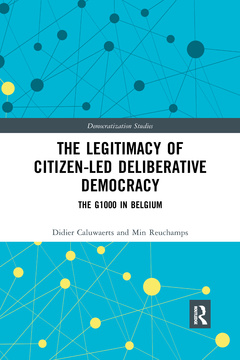Description
The Legitimacy of Citizen-led Deliberative Democracy
The G1000 in Belgium
Democratization and Autocratization Studies Series
Authors: Caluwaerts Didier, Reuchamps Min
Language: English
Subject for The Legitimacy of Citizen-led Deliberative Democracy:
Keywords
Deliberative Mini-publics; Citizen Summit; regionalism; Direct Democracy; federalism; Democratic Innovations; mini-publics; Political Uptake; Belgium; Deliberative Democracy; G1000; Citizen Panel; Belgian Political System; democracy; External Political Efficacy; Min Reuchamps; Deliberative Events; Throughput Legitimacy; Internal Political Efficacy; Discourse Quality Index; Deliberative System; G1000 Project; Consociational Decision Making; Official Political Actors; Leopold III; Common Language; RTBF; Deliberative Poll; Strong Representativeness; Deliberative Legitimacy; LBP; Van Parys
50.12 €
In Print (Delivery period: 14 days).
Add to cartPublication date: 08-2020
· 15.6x23.4 cm · Paperback
166.30 €
In Print (Delivery period: 14 days).
Add to cartPublication date: 06-2018
· 15.6x23.4 cm · Hardback
Description
/li>Contents
/li>Readership
/li>Biography
/li>
For deliberative democrats, the strength of any democracy is public deliberation, the frequent and reasoned discussion between citizens on political issues.
Despite all the theoretical claims made about deliberative systems, the question remains how to empirically assess both the legitimacy and function of deliberative systems in the real world and how individual sites of deliberation interact within the larger political system. In other words, what is the legitimacy of each individual component and under which conditions can these components improve the legitimacy of the wider system? These are the central research questions for this book looking particularly through the prism of the citizen-led mini-public G1000 in Belgium, which grew out of a feeling of deep democratic crisis. Offering empirically measurable translations of philosophical concepts, the book enhances our understanding of how political systems function, and of the viability of a deliberative democracy at a larger scale. Finally, it provokes fundamental normative questions on how we want to shape our society, especially divided ones.
This text will be of key interest to scholars, students and practitioners of deliberative democracy, and to those interested in democratic theory and more broadly political science, communication, sociology, and philosophy.
Introduction: Studying the Legitimacy of Citizen-led Deliberative Democracy 1. Democratic Innovation in an Unlikely Place 2. The G1000 and the Funnel of Citizen Participation 3. Participants and Non-participants 4. Democratic Credentials and Trade-offs 5. Deliberation and the Challenge of Multilingualism 6. Political Uptake 7. Public Endorsement 8. Social Offspring and Long-term Consequences Conclusion: Deliberation between Mini- and Maxi-public
Didier Caluwaerts is an Assistant Professor of Public Policy at the Vrije Universiteit Brussel, Belgium. His research interests are deliberative and participatory democracy, and democratic, social, and public sector innovation.
Min Reuchamps is Professor of Political Science at the Université Catholique de Louvain, Belgium. His teaching and research interests are federalism and multi-level governance, democracy and its different dimensions, as well as participatory and deliberative methods.




